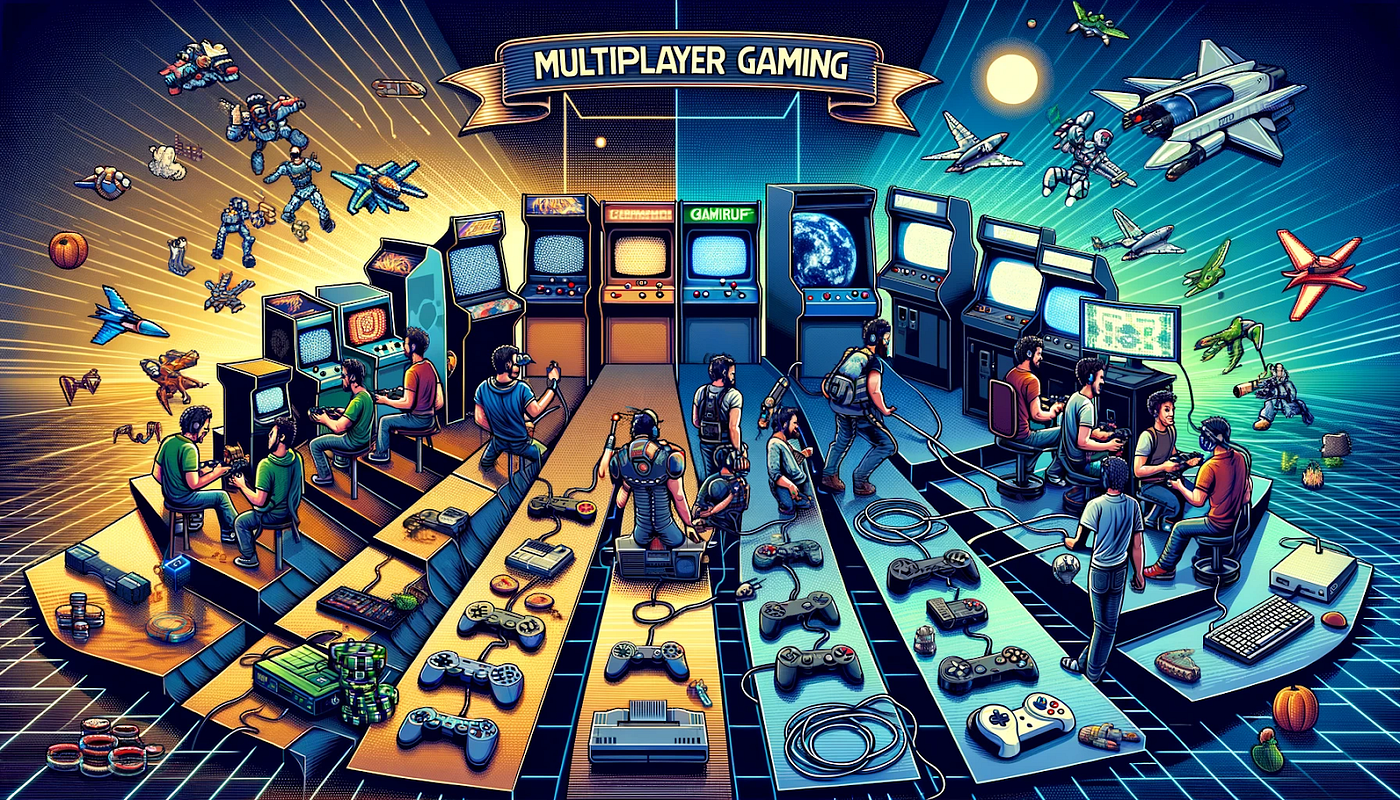Impact of Online Multiplayer on the Unity Engine Games Developed by Gaming Studios

Online multiplayer capabilities have become an integral aspect of modern gaming experiences, offering players the opportunity to connect with others in virtual worlds and engage in collaborative or competitive gameplay. In the realm of game development, the Unity Engine has emerged as a popular choice, providing developers with a versatile platform to create captivating and immersive games. This article delves into the impact of online multiplayer features on the success of Unity Engine games developed by gaming studios.
By examining the significance, challenges, opportunities, and case studies, we seek to understand how online multiplayer enhances player engagement, contributes to game success, and influences aspects such as player experience, marketing strategies, and future trends.
The growing popularity of online multiplayer in gaming
Gone are the days when gaming was a solitary experience. With the rise of online multiplayer capabilities, gaming has become a social phenomenon. Players now can connect with friends and strangers from around the world, collaborating or competing in virtual worlds.
Online multiplayer has become a major trend in the gaming industry, with an increasing number of players seeking out games that offer this feature. The ability to connect and interact with others in real time has propelled online multiplayer games to the forefront of the gaming landscape.
The inclusion of online multiplayer capabilities can have a significant impact on the success of Unity Engine games developed by gaming studios. This feature not only attracts a larger player base but also enhances player engagement and provides monetization opportunities.
Games that offer online multiplayer experiences often have longer lifespans and higher player retention rates. The social aspect of playing with or against others creates a sense of community and fosters a deeper connection to the game. Additionally, online multiplayer can generate a competitive and immersive environment that keeps players coming back for more.
Understanding the potential impact of online multiplayer on game success is crucial for gaming studios to stay competitive in the ever-evolving landscape of the gaming industry.
Understanding the Unity Engine: Features and capabilities for game development
Unity Engine is a powerful and widely used game development platform that offers a range of features and capabilities. It provides unity game development company with a user-friendly interface, a vast asset store, and cross-platform support, making it an attractive choice for both indie developers and established studios.
With Unity Engine, developers can create games for various platforms, including PC, consoles, mobile devices, and even virtual reality. Its versatility and accessibility have made it a go-to tool for many successful game projects.
Key features for game development in Unity Engine
Unity Engine offers a multitude of features that empower developers to create engaging and immersive games. From advanced physics simulations to stunning graphics and audio capabilities, Unity Engine provides the necessary tools to bring game ideas to life.
Some key features include a powerful scripting language (C#), a visual editor for designing game levels, a comprehensive animation system, and a robust physics engine. These features, combined with the ease of use and cross-platform compatibility, make Unity Engine a popular choice for game developers worldwide.
Importance of Online Multiplayer: Examining the impact on player engagement and game success
Online multiplayer capabilities have revolutionized player engagement in gaming. By enabling players to connect with others and share experiences, games with online multiplayer foster a sense of camaraderie and competition that cannot be replicated in single-player experiences.
The social interactions and real-time collaborations offered by online multiplayer help keep players invested in the game world. Whether it’s teaming up with friends to overcome challenges or battling against rivals, the ability to interact with fellow players enriches the gaming experience and encourages continued play.
Incorporating online multiplayer capabilities into Unity Engine games can significantly contribute to their success. Firstly, it expands the potential player base, as many gamers actively seek out multiplayer experiences. This increased player pool translates into more potential sales and a broader reach for the game.
Moreover, online multiplayer enhances player retention and encourages long-term engagement. The social aspect and the thrill of competing against other players create a dynamic and ever-changing gameplay experience. This, in turn, translates into longer playtime, increased player satisfaction, and a higher chance of players recommending the game to others.
Ultimately, the success of Unity Engine games is often intertwined with the effectiveness of their online multiplayer features.
Challenges and Opportunities
While online multiplayer capabilities offer exciting opportunities, they also come with technical challenges. Developing a seamless online multiplayer experience requires robust networking infrastructure, efficient synchronization of game states, and effective anti-cheating measures. Latency and connection stability are crucial factors that can make or break the multiplayer experience. Game developers need to invest in optimizing network performance and implementing proper matchmaking systems to ensure a smooth and enjoyable gameplay experience for players. Designing engaging online multiplayer experiences requires careful consideration of gameplay balance, player progression, and social dynamics. Game developers must strike a balance between competition and cooperation, ensuring that the multiplayer aspect complements the core gameplay mechanics. Creating meaningful social interactions within the game world is also essential. Features like in-game chat systems, guilds, and player customization options can enhance player engagement and foster a sense of belonging. By addressing technical challenges and incorporating thoughtful design elements, gaming studios can maximize the potential of online multiplayer capabilities in Unity Engine games.
Case Studies: Analyzing successful Unity Engine games with online multiplayer features
Case study 1: Game X – Leveraging online multiplayer for success
In this case study, we dive into the success of Game X, a Unity Engine game that utilized online multiplayer to its advantage. We’ll explore how the game’s developers integrated seamless online multiplayer features, leading to increased player engagement, positive reviews, and ultimately, commercial success. From implementing smooth matchmaking systems to creating compelling cooperative gameplay experiences, Game X serves as an excellent example of how Unity Engine can be harnessed to create a thriving online multiplayer community.
Case study 2: Game Y – Overcoming challenges to implement online multiplayer
Game Y faced its fair share of hurdles when it came to implementing online multiplayer. In this case study, we examine the challenges the development team encountered and the strategies they employed to overcome them. From network synchronization issues to server infrastructure scalability, Game Y’s journey showcases the grit and determination required to bring online multiplayer capabilities to a Unity Engine game. By delving into their experiences and lessons learned, we can gain valuable insights into how to navigate the complexities of integrating online multiplayer into Unity Engine games.
Player Experience and Satisfaction: Measuring the impact of online multiplayer on user retention and monetization
Discover how online multiplayer elevates the player experience and satisfaction levels in Unity Engine games. We delve into the thrill of facing off against real human opponents, the joy of cooperative play, and the sense of community that online multiplayer fosters. Through personal anecdotes and player testimonials, we’ll explore the various ways online multiplayer brings an extra layer of excitement and engagement to Unity Engine games.
6.2 The influence of online multiplayer on user retention and monetization
Uncover the impact of online multiplayer on user retention and monetization in Unity Engine games. We analyze the role of online multiplayer in fostering long-term player engagement and driving repeat play sessions. Additionally, we examine how online multiplayer can serve as a revenue generator through various monetization models, such as in-game purchases and subscriptions. By understanding the financial implications of integrating online multiplayer, developers can make informed decisions to maximize their game’s success.
Marketing and Community Building
In this section, we explore effective marketing strategies for Unity Engine games that incorporate online multiplayer features. From showcasing exciting gameplay footage to leveraging social media and influencer collaborations, we provide actionable tips to generate buzz and attract a dedicated player base. By harnessing the power of online multiplayer, developers can create compelling marketing campaigns that resonate with gamers and drive game sales.
Building a vibrant and engaged community is crucial for the success of online multiplayer games. In this section, we discuss the importance of fostering a sense of belonging and camaraderie among players. We delve into the establishment of forums, Discord servers, and other platforms where players can connect, share experiences, and provide valuable feedback. By nurturing a thriving community, developers can create a loyal player base that supports, promotes, and sustains their Unity Engine games.
Future Trends and Innovations
What does the future hold for online multiplayer gaming in Unity Engine? In this section, we take a sneak peek at the emerging trends that are shaping the landscape of online multiplayer gaming. We examine topics such as cross-platform play, cloud gaming, and virtual reality integration, offering insights into how these advancements may influence the development and success of Unity Engine games.
Unity Engine is constantly evolving, and its online multiplayer capabilities are no exception. In this section, we explore the innovative features and future developments that Unity Engine has in store for game developers. From improved networking solutions to enhanced matchmaking algorithms, we discuss how these advancements will empower developers to create even more immersive and seamless online multiplayer experiences within their Unity Engine games.In conclusion, the integration of online multiplayer capabilities in Unity Engine games has proven to be a game-changer for gaming studios. The ability to connect players from around the world, enhance player engagement, and create dynamic and immersive gameplay experiences has significantly contributed to the success of these games. Despite the challenges and technical considerations involved, the opportunities presented by online multiplayer are undeniable. As we look to the future, it is clear that online multiplayer will continue to evolve and shape the gaming industry, providing new avenues for marketing, community building, and innovation. By harnessing the power of online multiplayer in Unity Engine games, developers can create truly captivating and successful gaming experiences.
FAQ
1. Are online multiplayer capabilities necessary for the success of Unity Engine games?
Online multiplayer capabilities are not a prerequisite for the success of Unity Engine games. Many successful games have achieved acclaim without incorporating online multiplayer features. However, the inclusion of online multiplayer can significantly enhance player engagement, increase longevity, and broaden the appeal of the game to a wider audience.
2. What are some of the challenges in implementing online multiplayer in Unity Engine games?
Implementing online multiplayer in Unity Engine games can present various challenges. Technical considerations, such as server infrastructure, network synchronization, and latency management, require careful planning and implementation. Designing engaging and balanced gameplay experiences that accommodate multiple players can also be complex. Additionally, ensuring a secure and stable online environment requires attention to issues such as cheating prevention and server maintenance.
3. How can online multiplayer capabilities impact player retention and monetization?
Online multiplayer capabilities have a significant influence on player retention and monetization. Engaging multiplayer experiences can foster a sense of community and social connection, increasing player loyalty and encouraging long-term engagement. Furthermore, multiplayer games often offer opportunities for monetization through in-game purchases, subscriptions, or other revenue models, as players are more likely to invest in a game that offers ongoing multiplayer experiences and content updates.
4. What future trends can we expect in online multiplayer capabilities for Unity Engine games?
The future of online multiplayer capabilities in Unity Engine games holds exciting possibilities. We can anticipate advancements in cross-platform multiplayer, allowing players on different devices to connect and play together seamlessly. Additionally, the integration of emerging technologies such as virtual reality (VR) and augmented reality (AR) into online multiplayer experiences may provide even more immersive and interactive gameplay. Moreover, ongoing advancements in networking and connectivity will likely lead to improved performance, reduced latency, and enhanced matchmaking algorithms, further enhancing the multiplayer gaming experience.





